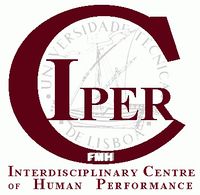Faculdade de Motricidade Humana - Universidade Técnica de Lisboa: Difference between revisions
(Created page with "{{Infobox organization |name = UNIVERSIDADE TECNICA DE LISBOA – UTL |image = FMH_logo.jpg |image_border = |size = |alt = |caption ...") |
No edit summary |
||
| (7 intermediate revisions by 2 users not shown) | |||
| Line 1: | Line 1: | ||
{{Infobox organization | {{Infobox organization | ||
|name = | |name = Faculdade de Motricidade Humana - Universidade Técnica de Lisboa | ||
|image = | |image = CIPER_cas_Vert_Ing.jpg | ||
|image_border = | |image_border = | ||
|size = | |size = | ||
| Line 14: | Line 14: | ||
|formation = | |formation = | ||
|extinction = | |extinction = | ||
|type = | |type = University | ||
|status = | |status = | ||
|purpose = | |purpose = | ||
| Line 30: | Line 30: | ||
|num_volunteers = | |num_volunteers = | ||
|budget = | |budget = | ||
|website = http://www.utl.pt | |website = http://www.fmh.utl.pt | ||
|remarks = | |remarks = | ||
}} | }} | ||
| Line 36: | Line 36: | ||
==Relation to [[Future Worlds Center]]== | ==Relation to [[Future Worlds Center]]== | ||
Partners with [[Future Worlds Center]] in [[CARDIAC]] project. | Partners with [[Future Worlds Center]] in [[CARDIAC]] project. People in charge were, Dr. Ana Cristina Espadinha and Prof. [[Leonor Moniz Pereira]]. | ||
The Faculdade de Motricidade Humana (Faculty of Human Kinetics-FMH) is the oldest sports and physical education faculty in Portugal. It became part of the Technical University of Lisbon in 1975. Originally an institution that focused on physical education in schools, with a strong emphasis on pedagogy, the Faculty is nowadays open to a wider range of study areas of interest to different sectors of society – the education system, sports, health, industry, and the arts – with which it cooperates in a lively and fruitful way. | |||
The main goal of FMH is human development through movement, by means of the study of the body and its manifestations in the interaction between biological processes and sociocultural values. | |||
The Faculty is proud of its partnerships with universities and public and private entities, through which it develops positive, reciprocal relationships in the scientific field and in the training of teaching staff, both of which have a positive impact on the quality of education it provides for its students. | |||
FMH has traditional premises of considerable historic value as well as modern units well equipped for the successful training of students and for research. FMH laboratories house various research projects, which require dynamic participation from postgraduate students and have strong links to the surrounding community. | |||
===CIPER=== | |||
The "Interdisciplinary Centre for the Study of Human Performance" (CIPER) is a Research Unit located at the Faculdade de Motricidade Humana - Technical University of Lisbon, aiming at promoting multidisciplinary research synergies. Its research is rooted within human functioning and performance and applies multidimensional models looking at the interaction of body structure, functions, activities performance and contextual factors. CIPER focuses on the identification and understanding of human functioning, performance determinants and their optimization. Human activity is analysed in different contexts, taking into account lifespan and human diversity (including disability), with the purpose of improving research and intervention methods and promote health and well-being. | |||
==External Links== | ==External Links== | ||
*[http://www.utl.pt Official Website] | *[http://www.fmh.utl.pt Official Website] | ||
*[http://www.fmh.utl.pt/ciper CIPER] | |||
[[Category:Partner Organizations (EU)]] | [[Category:Partner Organizations (EU)]] | ||
Latest revision as of 09:42, 23 January 2013
| Faculdade de Motricidade Humana - Universidade Técnica de Lisboa | |
|---|---|
 | |
| Abbreviation | FMH |
| Type | University |
| Location | Portugal |
| Website | http://www.fmh.utl.pt |
Relation to Future Worlds Center
Partners with Future Worlds Center in CARDIAC project. People in charge were, Dr. Ana Cristina Espadinha and Prof. Leonor Moniz Pereira.
The Faculdade de Motricidade Humana (Faculty of Human Kinetics-FMH) is the oldest sports and physical education faculty in Portugal. It became part of the Technical University of Lisbon in 1975. Originally an institution that focused on physical education in schools, with a strong emphasis on pedagogy, the Faculty is nowadays open to a wider range of study areas of interest to different sectors of society – the education system, sports, health, industry, and the arts – with which it cooperates in a lively and fruitful way. The main goal of FMH is human development through movement, by means of the study of the body and its manifestations in the interaction between biological processes and sociocultural values.
The Faculty is proud of its partnerships with universities and public and private entities, through which it develops positive, reciprocal relationships in the scientific field and in the training of teaching staff, both of which have a positive impact on the quality of education it provides for its students. FMH has traditional premises of considerable historic value as well as modern units well equipped for the successful training of students and for research. FMH laboratories house various research projects, which require dynamic participation from postgraduate students and have strong links to the surrounding community.
CIPER
The "Interdisciplinary Centre for the Study of Human Performance" (CIPER) is a Research Unit located at the Faculdade de Motricidade Humana - Technical University of Lisbon, aiming at promoting multidisciplinary research synergies. Its research is rooted within human functioning and performance and applies multidimensional models looking at the interaction of body structure, functions, activities performance and contextual factors. CIPER focuses on the identification and understanding of human functioning, performance determinants and their optimization. Human activity is analysed in different contexts, taking into account lifespan and human diversity (including disability), with the purpose of improving research and intervention methods and promote health and well-being.